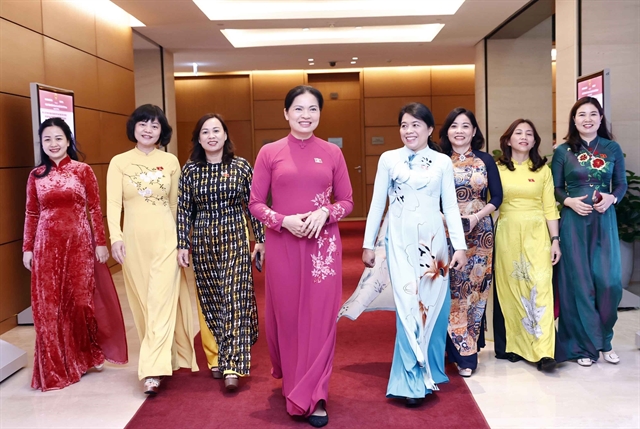 Society
Society

 |
| Female National Assembly (NA) deputies at the third session of the 15th NA in June 2022. The percentage of women in the NA is now at 30.26 per cent. — VNA/VNS Photo |
HÀ NỘI — Political participation and innovations of women are considered key to the socio-economic development of Việt Nam, a workshop held in Hà Nội was told on Tuesday ahead of Vietnamese Women’s Day.
The UN Development Programme (UNDP) held the event with National Assembly (NA) deputies, and representatives from ministries and relevant government agencies, academia, civil society, and development partners to reflect on the journey of women’s political participation and women-led innovations for the country's development.
Việt Nam has achieved commendable progress compared to other countries in the region. According to the 2022 World Economic Forum Gender Gap Report, Việt Nam scores 0.705 on a scale from 0 to 1 in terms of the gender gap index, ranking 83 out of 146 countries, improving its position from 87 in 2021.
The 2021 election resulted in an increased number of women deputies to the NA and provincial People’s Council. The percentage of women in the 15th National Assembly Plenum is now at 30.26 per cent, which is higher than the previous term. Similarly, women's representation in the People’s Council Offices at all levels was also higher.
However, women are not well represented in the executive office or the higher echelons of power. The decreased number of women’s representation in the 13th Party Congress and the 13th Politburo has shown that progress towards targets is not steady.
Women’s participation at the local level faces even greater challenges. According to UNDP PAPI findings over the last two years, women are particularly under-represented at the local level, particularly in village leadership positions. In 2019, of 812 villages surveyed, only 101 (accounting for 12 per cent) had female leaders. The remaining 88 per cent had male village leaders. The evidence from PAPI also strongly suggests that the additional bias against women holding village leadership positions is higher in rural areas than urban areas.
Việt Nam has only three more years to reach its own target of 60 per cent of the state agencies and local governments having key female leaders by 2025, and only seven more years, to achieve 75 per cent of the state agencies and local governments having key female leaders and 35 per cent women’s representation in the National Assembly by 2030.
Participants discussed ways to better understand the underlying causes of women’s under-representation in politics and shared ideas about new initiatives to address the existing gender gap and identify a clear roadmap to achieve all national targets, especially efforts to tackle deeply rooted social norms and beliefs against women leaders as well as ways to strengthen leadership capacities that are key to promote future female leadership.
Head of the International Cooperation Department under the Hồ Chí Minh National Academy of Politics Hoàng Văn Nghĩa said all subjects involved in the construction and development process of the country play an important role, particularly women because they are those who transform the process of perception and mindset from the grassroots level.
Head of the Institute of Social Development Studies Khuất Thu Hồng said the percentage of Vietnamese women in the NA at different terms has yet to reach the set target of 35 per cent. However, Việt Nam has topped ASEAN in terms of the rate of women’s representation in the NA since 2000 which is also higher than the global average.
She recommended some measures to increase women's political participation, including raising awareness of the public about gender equality, completing the policy framework, promoting gender equality in the workplace, changing the approach to female workers and improving social security policies.
UNDP Resident Representative Ramla Khalidi shared UNDP approach to support Việt Nam achieve its ambitious targets. “Women are increasingly seen as active agents of change- the dynamic promoters of social transformations that can alter the lives of everyone,” she said.
“For that reason, UNDP’s approach is about empowering women as positive change agents in an inclusive public sphere by promoting their equal participation and representation at all levels.
"Besides tackling structural inequalities, we consider women as strategic partners whose active participation and ability in planning, design and implementation are essential to all of UNDP’s programming”.
On this occasion, UNDP launched its first-ever podcast ‘Descendants of Hai Bà Trưng’, featuring voices from the frontline of the climate crisis. Carefully curated, each episode showcases the journey of women from all backgrounds sharing their experiences in mobilising their communities and taking action in the field of agriculture, disaster risk reduction, circular economy, etc; to adapt and mitigate climate change. The podcast is expected to inspire women and ensure that women’s voices are not ‘left behind’ but rather heard at all levels. — VNS




